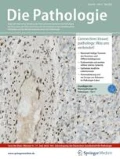Zusammenfassung
Das Institut für Pathologie des Universitätsklinikums Bonn führte unter seinen Einsendern eine Umfrage durch, um ihre Erwartungen an eine universitäre Pathologie zu untersuchen. Der Fragebogen umfasste 30 Kategorien, die Antworten erfolgten in Form einer Skalierung von 0 (unwichtig) bis 10 (sehr wichtig). Besonders wichtig waren den Einsendern eine schnelle Befundübermittlung, Freundlichkeit des Kontakts und ein einheitlicher Befundaufbau. Die Durchführung von Obduktionen, eine 24-h-Bereitschaft und eine Diagnostik am Samstag waren ihnen hingegen am unwichtigsten. Nach kritischer Analyse dieser Rückmeldungen kommen wir zu dem Schluss, dass die Pathologie droht, als reine Servicedisziplin wahrgenommen zu werden, und ihre Methoden und Möglichkeiten, aber auch ihre Anforderungen den Klinikern besser vermitteln sollte.
Abstract
The pathology department of the University Hospital Bonn conducted a survey among all its clients in order to evaluate their expectations concerning the diagnostics and service from a university department of pathology. A questionnaire including 30 topics was sent by mail to all senders. The questions could be answered using a scale ranging from “0” (“not important at all”) to “10” (“very important”). Most important for the clients were “speed of communication of the diagnosis”, “personal availability of the responsible pathologist by telephone” and “friendliness of contact”. Less important were “autopsy diagnostics”, “24 h on-call duty” and “service on Saturdays”. A critical analysis of the results made us realize that pathology is threatened to be seen exclusively as a service discipline and that we should convey its methods and possibilities and also its requirements better to clinicians.






Literatur
Rabbata S (2007) Pathologen: „Lotsen der Therapie“. Dtsch Ärztebl 104:A-1630/B-440/C-380
Gal AA (2001) In search of the origins of modern surgical pathology. Adv Anat Pathol 8:1–13
Becich MJ (2000) The role of the pathologist as tissue refiner and data miner: the impact of functional genomics on the modern pathology laboratory and the critical roles of pathology informatics and bioinformatics. Mol Diagn 5:287–299
Falk S (2001) [Modern quality management in pathology – accreditation according to EN DIN 45004: an experience report]. Z Arztl Fortbild Qualitatssich 95:4291433
Röcken C (2015) [Molecular pathology]. Pathologe 36:125
Perera NR, de Silva MV (2005) Use and interpretation of phrases in histopathology reports: interdisciplinary meetings will help to reduce the confusion. Ceylon Med J 50:138
Turnbull A, Osborn M, Nicholas N (2015) Hospital autopsy: Endangered or extinct? J Clin Pathol 68(8):601–604
Ayoub T, Chow J (2008) The conventional autopsy in modern medicine. J R Soc Med 101:177–181
Roberts WC (1978) The autopsy: its decline and a suggestion for its revival. N Engl J Med 299:332–338
Danksagungen
Wir danken Beate Roick für die exzellente administrative Unterstützung, Prof. N. Wernert und Prof. S. Perner für die kritische Durchsicht und vor allem aber Prof. Kurt Werner Schmid für die engagierte editorielle Begleitung.
Author information
Authors and Affiliations
Corresponding author
Ethics declarations
Interessenkonflikt
F. Fronhoffs, T. Thiesler und G. Kristiansen geben an, dass kein Interessenkonflikt besteht.
Dieser Beitrag beinhaltet keine Studien an Menschen oder Tieren.
Additional information
Redaktion
K.W. Schmid, Essen
Rights and permissions
About this article
Cite this article
Fronhoffs, F., Thiesler, T. & Kristiansen, G. Was wünschen unsere Einsender. Pathologe 38, 30–37 (2017). https://doi.org/10.1007/s00292-015-0049-4
Published:
Issue Date:
DOI: https://doi.org/10.1007/s00292-015-0049-4

